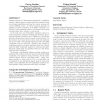Free Online Productivity Tools
i2Speak
i2Symbol
i2OCR
iTex2Img
iWeb2Print
iWeb2Shot
i2Type
iPdf2Split
iPdf2Merge
i2Bopomofo
i2Arabic
i2Style
i2Image
i2PDF
iLatex2Rtf
Sci2ools
112
click to vote
PODC
2010
ACM
2010
ACM
Adaptive randomized mutual exclusion in sub-logarithmic expected time
Mutual exclusion is a fundamental distributed coordination problem. Shared-memory mutual exclusion research focuses on local-spin algorithms and uses the remote memory references (RMRs) metric. A mutual exclusion algorithm is adaptive to point contention, if its RMR complexity is a function of the maximum number of processes concurrently executing their entry, critical, or exit section. In the best prior art deterministic adaptive mutual exclusion algorithm, presented by Kim and Anderson [22], a process performs O min(k, log N) RMRs as it enters and exits its critical section, where k is point contention and N is the number of processes in the system. Kim and Anderson also proved that a deterministic algorithm with o(k) RMR complexity does not exist [21]. However, they describe a randomized mutual exclusion algorithm that has O(log k) expected RMR complexity against an oblivious adversary. All these results apply for algorithms that use only atomic read and write operations. We presen...
Adaptive Mutual Exclusion | Distributed And Parallel Computing | Mutual Exclusion | Mutual Exclusion Algorithms | PODC 2010 |
| Added | 16 Aug 2010 |
| Updated | 16 Aug 2010 |
| Type | Conference |
| Year | 2010 |
| Where | PODC |
| Authors | Danny Hendler, Philipp Woelfel |
Comments (0)

